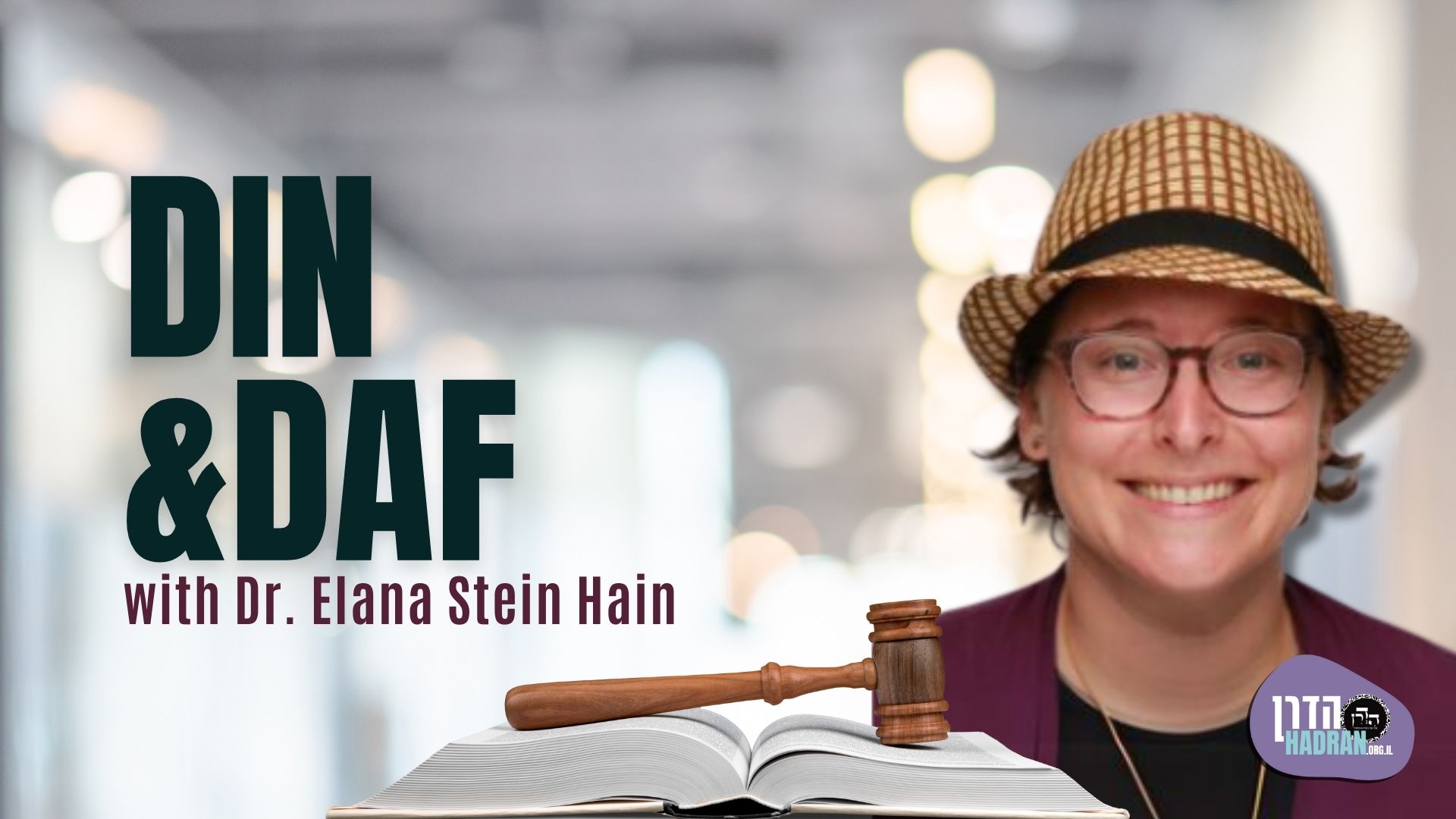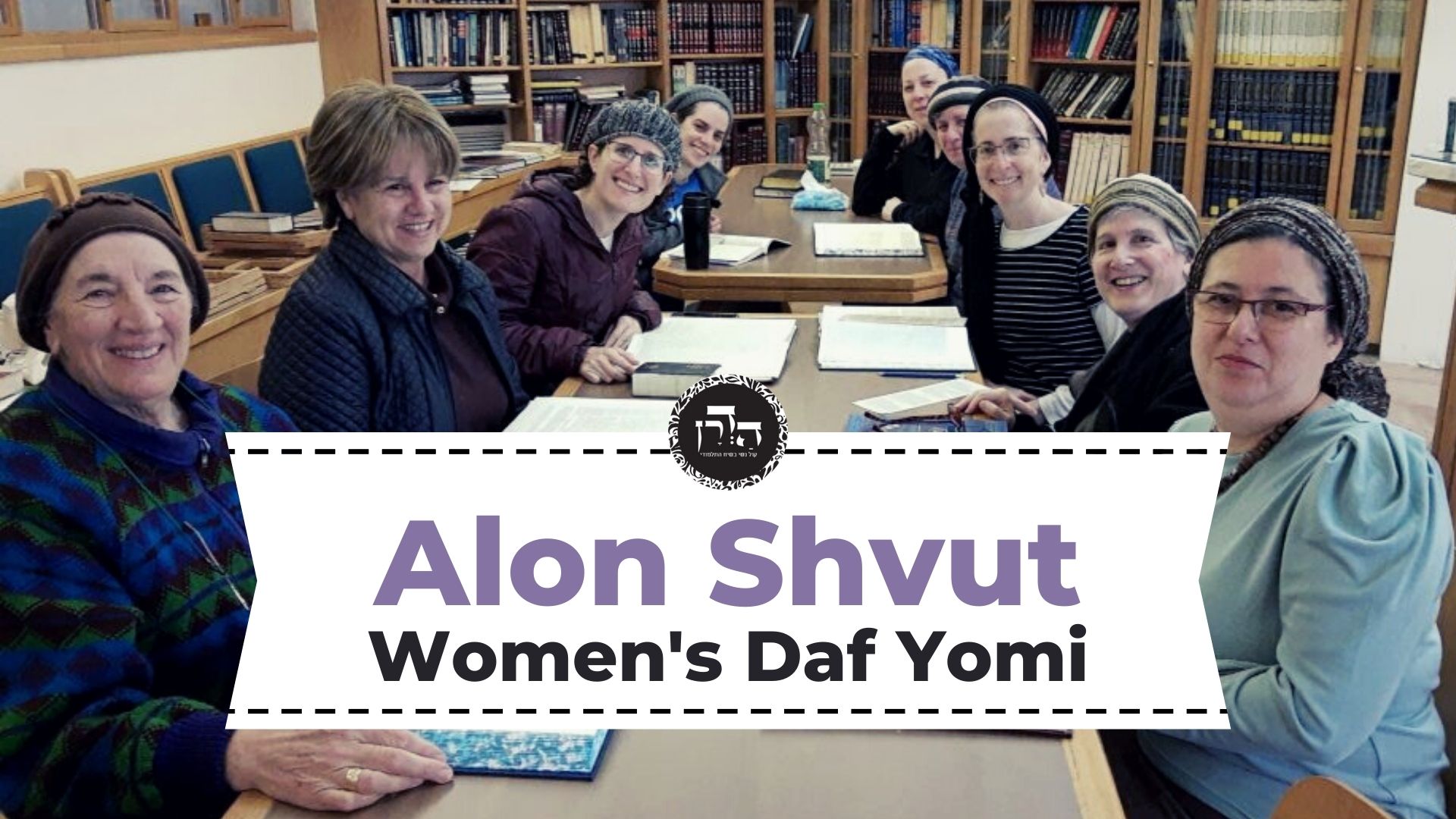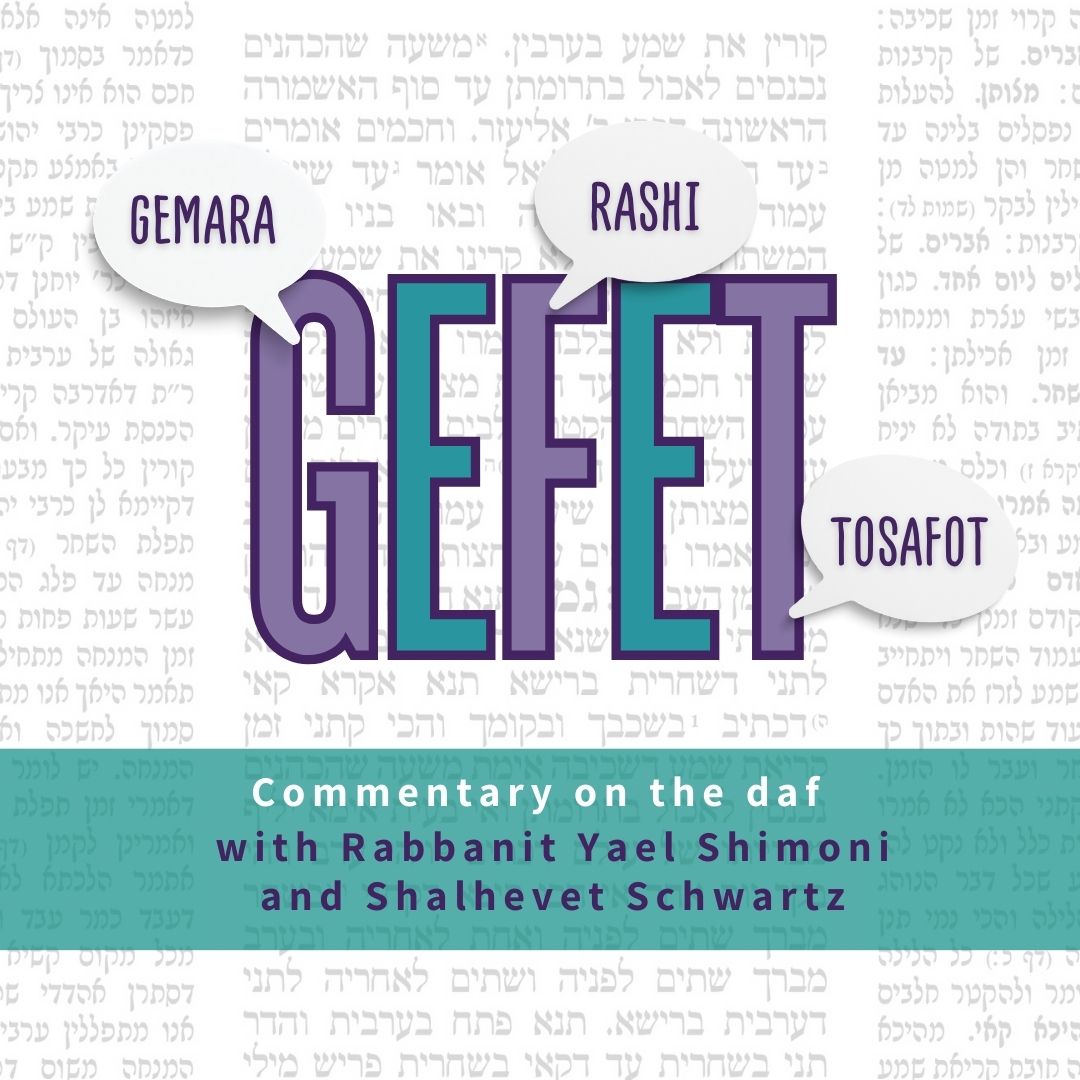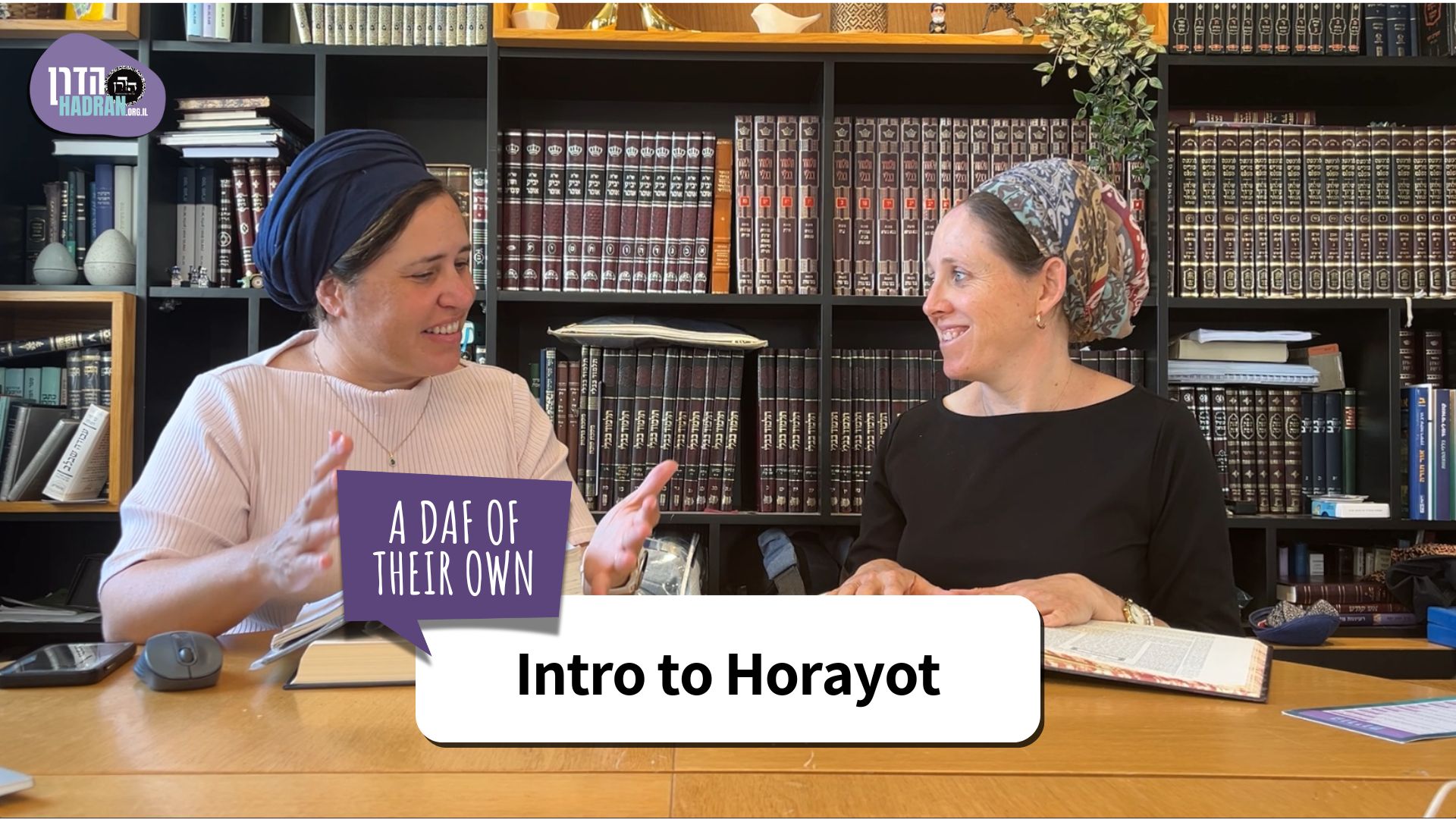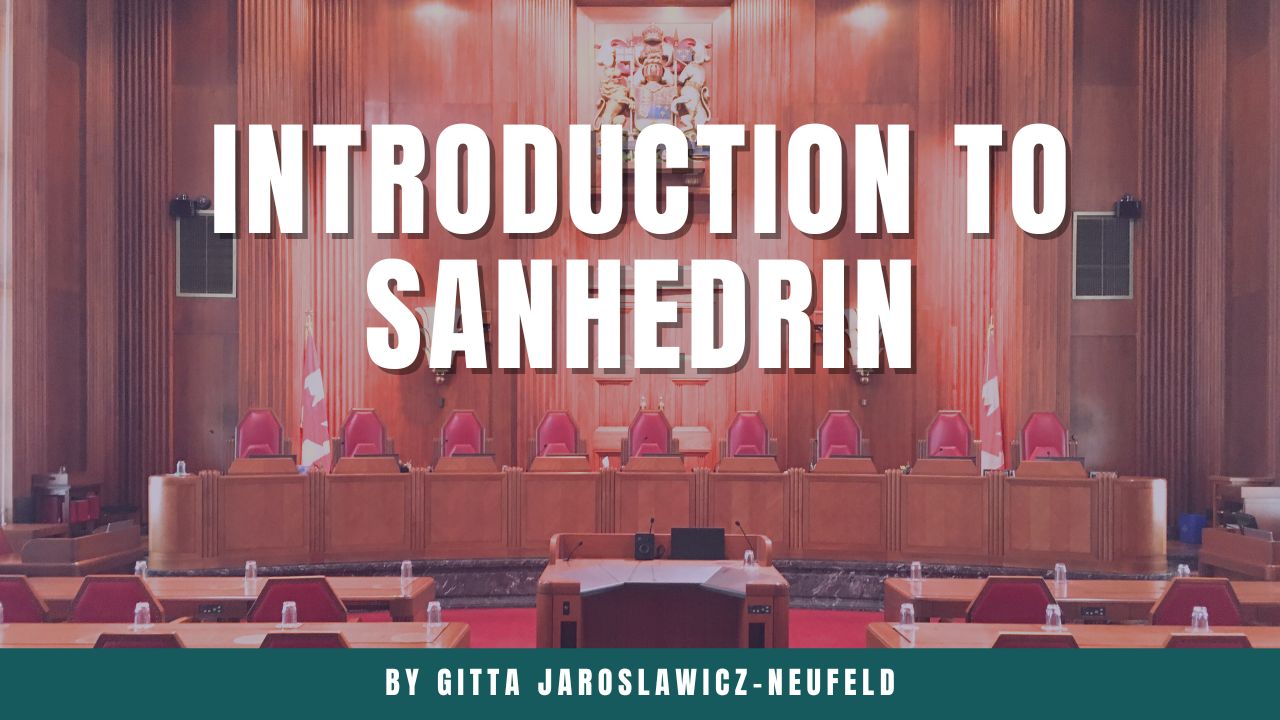One who dedicates all his possessions to the Temple or promises arakhin and doesn’t pay up, what is the connection of his wives or children – do they leave him money to support them? Can they take items belonging to them also? What items that belong to the person himself is he allowed to keep? The seventh chapter deals with one who dedicates to the Temple an ancestral field. When one redeems it, they pay 50 shekels for a size of land in which one grows a seah of barley. However, this number gets lower by a shekel (sela) and a pundyon (1/48 of a shekel) each year as it gets closer to the jubilee year. Rav and Shmuel debate whether one can dedicate a field in the jubilee year itself (if yes, then the 50 shekalim start in that year). Why does the amount get reduced by also a pundyon each year? How can that be explained both by Rav and Shmuel?
This week’s learning is sponsored for the merit and safety of Haymanut (Emuna) Kasau, who was 9 years old when she disappeared from her home in Tzfat two years ago, on the 16th of Adar, 5784 (February 25, 2024), and whose whereabouts remain unknown.
This week’s learning is dedicated of the safety of our nation, the soldiers and citizens of Israel, and for the liberation of the Iranian people. May we soon see the realization of “ליהודים היתה אורה ושמחה וששון ויקר”.
This week’s learning is sponsored for the merit and safety of Haymanut (Emuna) Kasau, who was 9 years old when she disappeared from her home in Tzfat two years ago, on the 16th of Adar, 5784 (February 25, 2024), and whose whereabouts remain unknown.
Want to dedicate learning? Get started here:


Today’s daily daf tools:
This week’s learning is sponsored for the merit and safety of Haymanut (Emuna) Kasau, who was 9 years old when she disappeared from her home in Tzfat two years ago, on the 16th of Adar, 5784 (February 25, 2024), and whose whereabouts remain unknown.
This week’s learning is dedicated of the safety of our nation, the soldiers and citizens of Israel, and for the liberation of the Iranian people. May we soon see the realization of “ליהודים היתה אורה ושמחה וששון ויקר”.
This week’s learning is sponsored for the merit and safety of Haymanut (Emuna) Kasau, who was 9 years old when she disappeared from her home in Tzfat two years ago, on the 16th of Adar, 5784 (February 25, 2024), and whose whereabouts remain unknown.
Today’s daily daf tools:
Delve Deeper
Broaden your understanding of the topics on this daf with classes and podcasts from top women Talmud scholars.
New to Talmud?
Check out our resources designed to help you navigate a page of Talmud – and study at the pace, level and style that fits you.
The Hadran Women’s Tapestry
Meet the diverse women learning Gemara at Hadran and hear their stories.
Arakhin 24
״וְאִם מָךְ הוּא מֵעֶרְכֶּךָ״ — הַחֲיֵיהוּ מֵעֶרְכֶּךָ.
“But if he be too poor for your valuation” (Leviticus 27:8). The word “he” [hu] is interpreted as a variation of havaya, existence or sustenance. In this manner the verse can be read as an instruction to the treasurer: Sustain him from that which he is obligated to pay for your valuation.
אֲבָל לֹא לְאִשְׁתּוֹ וּבָנָיו וְכוּ׳. מַאי טַעְמָא? ״הוּא מֵעֶרְכֶּךָ״, וְלֹא אִשְׁתּוֹ וּבָנָיו מֵעֶרְכֶּךָ.
The mishna teaches that food and garments are left for him, but not for his wife or his children. The Gemara asks: What is the reason? The verse states: “If he be too poor for your valuation,” which indicates that he must be sustained from your valuation, but his wife and his children are not sustained from your valuation.
רַבִּי אֱלִיעֶזֶר אוֹמֵר: אִם הָיָה אִיכָּר, נוֹתֵן לוֹ צִמְדּוֹ. וְרַבָּנַן? הָנְהוּ לָאו כְּלֵי אוּמָּנוּת נִינְהוּ, אֶלָּא נְכָסִים נִינְהוּ.
The mishna teaches: Rabbi Eliezer says that if he was a farmer, the treasurer gives him his pair of oxen; if he was a donkey driver, the treasurer gives him his donkey. The Gemara asks: And the Rabbis, why do they rule that these animals are repossessed? The Gemara responds: According to the Rabbis, these animals are not tools of his craft; rather, they are his property.
הָיָה לוֹ מִין אֶחָד. פְּשִׁיטָא! כִּי הֵיכִי דְּסַגִּי לֵיהּ עַד הַשְׁתָּא, הַשְׁתָּא נָמֵי סַגִּי לֵיהּ.
The mishna teaches that if one had many tools of one type that he was allowed to keep and few tools of one other type, e.g., three adzes and one saw, the treasurer does not sell tools of the type of which there are many in order to purchase for him tools of the type of which he has few. The Gemara asks: Isn’t it obvious? Just as it was sufficient for him until now to work with one saw, now too a single saw should be sufficient for him.
מַהוּ דְּתֵימָא: עַד הָאִידָּנָא דַּהֲוָה לֵיהּ לְאוֹשׁוֹלֵי הֲוָה מוֹשְׁלִי לֵיהּ, הַשְׁתָּא דְּלֵיכָּא דְּמֹשֵׁיל לֵיהּ — לָא, קָא מַשְׁמַע לַן.
The Gemara explains that the ruling is necessary lest you say that until now, when he was capable of lending one of his many adzes, if he required an additional saw someone would lend one to him, whereas now that his property has been repossessed there is no one who will lend such a tool to him, when he has nothing to offer in exchange. Consequently, the treasurer should not leave him with only one saw, but he should sell some of his adzes in order to purchase an additional saw. Therefore, the mishna teaches us that there is no concern that he might not be able to borrow a tool.
הַמַּקְדִּישׁ אֶת נְכָסָיו מַעֲלִין לוֹ תְּפִילִּין. הָהוּא גַּבְרָא דְּזַבְּנִינְהוּ לְנִכְסֵיהּ, אֲתָא לְקַמֵּיהּ דְּרַב יֵימַר, אֲמַר לְהוּ: סַלִּיקוּ לֵיהּ תְּפִילִּין. מַאי קָא מַשְׁמַע לַן? מַתְנִיתִין הִיא! ״הַמַּקְדִּישׁ נְכָסָיו מַעֲלִין לוֹ תְּפִילָּיו״.
§ The mishna teaches: With regard to one who consecrates all his property, the treasurer takes his phylacteries. The Gemara relates that there was a certain man who sold his property. He came before Rav Yeimar, who said to the members of the court: Remove his phylacteries from his head and his arm and give them to the buyer, as they are included in his property. The Gemara asks: What is this incident teaching us? It is an explicit ruling of the mishna: With regard to one who consecrates all his property, the treasurer takes his phylacteries.
מַהוּ דְּתֵימָא, הָתָם הוּא דְּסָבַר מִצְוָה קָא עָבֵידְנָא, אֲבָל לְעִנְיַן זַבּוֹנֵי — מִצְוָה דְּגוּפֵיהּ לָא (זבין) [מְזַבֵּין] אִינִישׁ, קָא מַשְׁמַע לַן.
The Gemara explains: It is necessary, lest you say that it is only there, when one consecrates his property, that the halakha is that his phylacteries are taken, as he thinks to himself: I am performing a mitzva, and therefore he intended for his phylacteries to be included. But with regard to a sale, a person would not sell an item used for a mitzva that he performs with his body without explicitly stating so. The Gemara therefore teaches us by means of the above incident that phylacteries are included in the property of such a sale.
מַתְנִי׳ אֶחָד הַמַּקְדִּישׁ נְכָסָיו, וְאֶחָד הַמַּעֲרִיךְ עַצְמוֹ, אֵין לוֹ בִּכְסוּת אִשְׁתּוֹ, וְלֹא בִּכְסוּת בָּנָיו, וְלֹא בְּצֶבַע שֶׁצָּבַע לִשְׁמָן, וְלֹא בְּסַנְדָּלִים חֲדָשִׁים שֶׁלְּקָחָן לִשְׁמָן.
MISHNA: Both in the case of one who consecrates his property and the case of one who valuates himself, when the Temple treasurer repossesses his property he has the right to repossess neither the garment of his wife nor the garment of his children, nor the dyed garments that he dyed for their sake, even if they have yet to wear them, nor the new sandals that he purchased for their sake.
אַף עַל פִּי שֶׁאָמְרוּ: עֲבָדִים נִמְכָּרִין בִּכְסוּתָן לְשֶׁבַח, שֶׁאִם תִּלָּקַח לוֹ כְּסוּת בִּשְׁלֹשִׁים דִּינָר מְשׁוּבָּח מָנֶה, וְכֵן פָּרָה אִם מַמְתִּינִין אוֹתָהּ לָאִיטְלֵיס מְשׁוּבַּחַת הִיא, וְכֵן מַרְגָּלִית אִם מַעֲלִין אוֹתָהּ לַכְּרַךְ מְשׁוּבַּחַת הִיא — אֵין לַהֶקְדֵּשׁ אֶלָּא מְקוֹמוֹ וּשְׁעָתוֹ.
Although the merchants said: Slaves are sold in their garments for profit, as if a fine garment worth thirty dinars would be purchased for him, his sale price appreciates by one hundred dinars; and likewise with regard to a cow, if one waits to sell it until the market [la’itlis] day, when demand is high, its sale price appreciates; and likewise with regard to a pearl, if one brings it to sell it in the city, where demand is high, its sale price appreciates; nevertheless, one does not make such a calculation in this case. Rather, the Temple treasury has the right to collect the item based only on its current location and its price at the present time.
גְּמָ׳ תָּנוּ רַבָּנַן: ״וְנָתַן אֶת הָעֶרְכְּךָ בַּיּוֹם הַהוּא״ — שֶׁלֹּא יְשַׁהֶה מַרְגָּלִית לְקַלִּים, ״קֹדֶשׁ לַה׳״ — סְתָם הַהֶקְדֵּישׁוֹת לְבֶדֶק הַבַּיִת.
GEMARA: With regard to the statement of the mishna that the Temple treasury has the right to collect the item based only on its current location and its present time, the Sages taught in a baraita: The verse states, with regard to the redemption of a consecrated item: “And he shall give your valuation as of that day” (Leviticus 27:23). The phrase “as of that day” indicates that he should not delay the sale of a pearl for the light ones, i.e., for poor people, in order that they should take it to the city to sell it. Rather, it is appraised according to its present location. The verse continues: “As a holy thing unto the Lord,” which teaches that unspecified vows of consecration, e.g., when one states: My property is consecrated, are given for Temple maintenance, rather than to the priests.
הֲדַרַן עֲלָךְ שׁוּם הַיְּתוֹמִים.
מַתְנִי׳ אֵין מַקְדִּישִׁין לִפְנֵי הַיּוֹבֵל פָּחוֹת מִשְׁתֵּי שָׁנִים, וְלֹא גּוֹאֲלִין אַחַר הַיּוֹבֵל פָּחוֹת מִשָּׁנָה אַחַת. אֵין מְחַשְּׁבִין חֳדָשִׁים לַהֶקְדֵּשׁ, אֲבָל הֶקְדֵּשׁ מְחַשֵּׁב חֳדָשִׁים.
MISHNA: One may neither consecrate an ancestral field, i.e., a field that he inherited, less than two years before the Jubilee Year, nor may one redeem such a field less than one year after the Jubilee Year. When redeeming an ancestral field that has been consecrated, the sum paid to redeem the field is calculated based on the number of years remaining until the Jubilee Year. When performing this calculation, one does not count months of a partial year in order to lower the price to be paid to the Temple treasury; rather, he pays for the entire year. But the Temple treasury may count months in order to raise the price of redemption, as will be explained.
גְּמָ׳ וּרְמִינְהוּ: מַקְדִּישִׁין בֵּין לִפְנֵי הַיּוֹבֵל בֵּין לְאַחַר הַיּוֹבֵל, וּבִשְׁנַת הַיּוֹבֵל עַצְמָהּ לֹא יַקְדִּישׁ, וְאִם הִקְדִּישׁ אֵינָהּ קְדוֹשָׁה!
GEMARA: The mishna teaches that one may not consecrate an ancestral field less than two years before the Jubilee Year. And with regard to this, the Gemara raises a contradiction from the following baraita: One may consecrate an ancestral field both before the Jubilee Year and after the Jubilee Year. But during the Jubilee Year itself, one may not consecrate it, and if he nevertheless did consecrate it, it is not consecrated. Although consecration of an ancestral field is ineffective during the Jubilee Year, it is clear that such a field may be consecrated at any time prior to the start of the year.
רַב וּשְׁמוּאֵל דְּאָמְרִי תַּרְוַיְיהוּ: אֵין מַקְדִּישִׁין לִיגָּאֵל בְּגֵירוּעַ פָּחוֹת מִשְׁתֵּי שָׁנִים, וְכֵיוָן דְּאֵין מַקְדִּישִׁין לִיגָּאֵל בְּגֵירוּעַ פָּחוֹת מִשְׁתֵּי שָׁנִים — יְהֵא אָדָם חָס עַל נְכָסָיו וְאַל יַקְדִּישׁ פָּחוֹת מִשְׁתֵּי שָׁנִים.
In response, Rav and Shmuel both say: The mishna means that one may not consecrate an ancestral field for it to be redeemed with a deduction, i.e., such that the redemption price will be reduced to reflect the number of years remaining until the Jubilee Year, less than two years before the Jubilee Year. If such a field is consecrated less than two years before the Jubilee, it is redeemed according to its full valuation, as though it had been consecrated and redeemed immediately after the Jubilee. And since one may not consecrate an ancestral field for it to be redeemed with a deduction less than two years before the Jubilee, the mishna teaches that a person should be concerned about his property, and should therefore not consecrate an ancestral field less than two years before the Jubilee.
אִיתְּמַר: הַמַּקְדִּישׁ שָׂדֵהוּ בִּשְׁנַת הַיּוֹבֵל עַצְמָהּ, רַב אָמַר: קְדוֹשָׁה, וְנוֹתֵן חֲמִשִּׁים, וּשְׁמוּאֵל אָמַר: אֵינָהּ קְדוֹשָׁה כׇּל עִיקָּר.
§ It was stated: With regard to one who consecrates his field during the Jubilee Year itself, Rav says: It is consecrated, and if he wishes to redeem it he gives the full valuation of fifty sela, i.e., fifty silver biblical shekels, per unit of area required for sowing one kor of seed [beit kor], and Shmuel says: It is not consecrated at all, and therefore it is not redeemed for any sum.
מַתְקֵיף לַהּ רַב יוֹסֵף: בִּשְׁלָמָא לְעִנְיַן מְכִירָה, דִּפְלִיג שְׁמוּאֵל עֲלֵיהּ דְּרַב, אִיכָּא לְמֵימַר קַל וָחוֹמֶר — וּמָה מְכוּרָה כְּבָר יוֹצְאָה עַכְשָׁיו, שֶׁאֵינָהּ מְכוּרָה אֵינוֹ דִּין שֶׁלֹּא תִּימָּכֵר?
Rav Yosef objects to this: Granted, with regard to the sale of an ancestral field during the Jubilee Year, it is logical that Shmuel disagrees with Rav and maintains that such a sale is invalid, as one can say the following a fortiori inference: And if a field that was already sold before the Jubilee Year leaves the possession of the buyer and returns to the original owner now in the Jubilee Year, then with regard to a field that has not been sold, is it not logical to conclude that it cannot be sold during the Jubilee Year?
אֶלָּא הָכָא, מִי אִיכָּא לְמֵימַר קַל וָחוֹמֶר? וְהָא תְּנַן: הִגִּיעַ יוֹבֵל וְלֹא נִגְאֲלָה — כֹּהֲנִים נִכְנָסִין לְתוֹכָהּ וְנוֹתְנִין דָּמֶיהָ, דִּבְרֵי רַבִּי יְהוּדָה.
But here, with regard to the consecration of a field during the Jubilee Year, can one say such an a fortiori inference? But didn’t we learn in a mishna (25b): If one consecrated his ancestral field and the Jubilee Year arrived and it was not redeemed by the owner, the priests enter into the field and give its redemption payment to the Temple treasury; this is the statement of Rabbi Yehuda? Since a field that was consecrated before the Jubilee Year does not return to its original owner without redemption, one cannot infer that if one consecrates his field during the Jubilee Year itself, it returns to him without redemption.
שְׁמוּאֵל כְּרַבִּי שִׁמְעוֹן סְבִירָא לֵיהּ, דְּאָמַר: ״נִכְנָסִין וְלֹא נוֹתְנִין״.
The Gemara answers: Shmuel holds in accordance with the opinion of Rabbi Shimon, who says that the priests enter into the field, but they do not give its redemption value to the Temple treasury. According to this opinion, a field consecrated before the Jubilee Year leaves the possession of the Temple treasury without redemption during the Jubilee Year, and therefore by a fortiori inference, if it was consecrated during the Jubilee Year, it does not require redemption.
וְרַב סָבַר: סוֹף סוֹף לַבְּעָלִים מִי קָהָדְרָא? לְכֹהֲנִים הוּא דְּנָפְקָא, וְכֹהֲנִים מִשּׁוּלְחַן גָּבוֹהַּ קָא זָכוּ!
And Rav holds: Even in accordance with the opinion of Rabbi Shimon, no a fortiori inference may be drawn, as ultimately, does the field return to the owner during the Jubilee Year? It does not, but rather it leaves the possession of the Temple treasury and is given to the priests. Therefore, there is no basis for an a fortiori inference, as a field consecrated before the Jubilee Year does not return to the owner during the Jubilee Year, and the priests receive their portion from the table of the Most High.
מַאי טַעְמָא דְּרַב? דְּאָמַר קְרָא ״וְאִם מִשְּׁנַת הַיּוֹבֵל״, וּשְׁנַת הַיּוֹבֵל בַּכְּלָל.
The Gemara asks: What is the reason for the opinion of Rav that consecration of a field during the Jubilee Year is effective and that the field must be redeemed for the full price of fifty sela per beit kor? As the verse states: “If he sanctifies his field from the Jubilee Year, according to your valuation it shall stand” (Leviticus 27:17). The verse indicates that a field is redeemed according to the valuation mentioned in the preceding verse, i.e., fifty sela per beit kor, and the Jubilee Year itself is included in this halakha, as the verse describes a period that begins “from the Jubilee Year,” which can be understood as including the Jubilee Year itself.
וּשְׁמוּאֵל, מִי כְּתִיב ״וְאִם בִּשְׁנַת הַיּוֹבֵל״? ״מִשְּׁנַת הַיּוֹבֵל״ כְּתִיב — מִשָּׁנָה שֶׁאַחַר הַיּוֹבֵל.
The Gemara asks: And how does Shmuel refute this claim? The Gemara explains that Shmuel would respond: Is it written in the verse: If he sanctifies his field during the Jubilee Year? No, instead: “From the Jubilee Year,” is written, indicating that the verse is referring to consecration beginning from the year that is after the Jubilee Year.
בִּשְׁלָמָא לְרַב, הַיְינוּ דִּכְתִיב: ״אִם מִשְּׁנַת הַיּוֹבֵל״ ״וְאִם אַחַר הַיּוֹבֵל״, אֶלָּא לִשְׁמוּאֵל, מַאי ״אַחַר הַיּוֹבֵל״? אַחַר אַחַר.
The Gemara asks: Granted, according to Rav, this is the meaning of that which is written in the verse: “If he sanctifies his field from the Jubilee Year, according to your valuation it shall stand. But if he sanctifies his field after the Jubilee, then the priest shall reckon for him the money according to the years that remain until the Jubilee Year, and a deduction shall be made from your valuation” (Leviticus 27:17–18). According to Rav’s interpretation, the second verse is referring to the year immediately following the Jubilee Year. But according to Shmuel, who maintains that the first verse is dealing with the year following the Jubilee Year, to what is the verse referring when it speaks of the year “after the Jubilee”? The Gemara responds: It is referring to the year after the year after the Jubilee Year.
מֵיתִיבִי: מַקְדִּישִׁין בֵּין לִפְנֵי הַיּוֹבֵל בֵּין לְאַחַר הַיּוֹבֵל, וּבִשְׁנַת הַיּוֹבֵל עַצְמָהּ לֹא יַקְדִּישׁ, וְאִם הִקְדִּישׁ — אֵינָהּ קְדוֹשָׁה! אָמַר לְךָ רַב: אֵינָהּ קְדוֹשָׁה בְּגֵירוּעַ, אֲבָל קְדוֹשָׁה וְנוֹתְנִין חֲמִשִּׁים.
The Gemara raises an objection to the opinion of Rav from the aforementioned baraita: One may consecrate an ancestral field both before the Jubilee Year and after the Jubilee Year. But during the Jubilee Year itself, one may not consecrate it, and if he nevertheless did consecrate it, that field is not consecrated. The Gemara explains: Rav could say to you: The baraita means that it is not consecrated in order to be redeemed with a deduction. But nevertheless it is consecrated, and one gives the full price of fifty sela per beit kor for its redemption.
מִכְּלָל דְּלִפְנֵי הַיּוֹבֵל קְדוֹשָׁה לִיגָּאֵל בְּגֵירוּעַ, וְהָא רַב וּשְׁמוּאֵל דְּאָמְרִי תַּרְוַיְיהוּ: אֵין מַקְדִּישִׁין לִיגָּאֵל בְּגֵירוּעַ פָּחוֹת מִשְׁתֵּי שָׁנִים!
The Gemara objects: One can conclude by inference from this response that according to Rav, when the baraita states that a field may be consecrated before the Jubilee Year, it means that it is consecrated to be redeemed with a deduction. But wasn’t it stated that Rav and Shmuel both say that one may not consecrate an ancestral field to be redeemed with a deduction less than two years before the Jubilee Year, but rather it is redeemed according to the total valuation of the field? If so, Rav could not have responded as suggested above.
אָמַר לְךָ רַב: הָא מַנִּי? רַבָּנַן הִיא, וַאֲנָא דְּאָמְרִי כְּרַבִּי, דְּאָמַר: ״רִאשׁוֹן״ וְרִאשׁוֹן בַּכְּלָל, ״שְׁבִיעִי״ וּשְׁבִיעִי בַּכְּלָל; הָכָא נָמֵי ״בִּשְׁנַת״ וּשְׁנַת הַיּוֹבֵל בַּכְּלָל.
Rather, Rav could say to you: In accordance with whose opinion is this baraita? It is in accordance with the opinion of the Rabbis, who maintain that whenever the verse employs an expression such as: From the first day, the first day itself is not included. Accordingly, when the verse states: “If he sanctifies his field from the Jubilee Year,” the Jubilee Year is not included. But I stated my ruling that a field may be consecrated during the Jubilee Year in accordance with the opinion of Rabbi Yehuda HaNasi, who says: The verse states: “Whoever eats leavened bread from the first day until the seventh day, that soul shall be cut off from Israel” (Exodus 12:15). It states: “From the first day,” and the first day is included, and it continues: “Until the seventh day,” and the seventh day is also included. Here too, the verse states: “If he sanctifies his field from the Jubilee Year,” and the Jubilee Year is included.
אִי כְּרַבִּי, פּוּנְדְּיוֹן מַאי עֲבִידְתֵּיהּ?
The mishna (25a) teaches that when one redeems an ancestral field, he gives a sela and a pundeyon, which is equivalent to one forty-eighth of a sela, per beit kor for each year remaining until the Jubilee Year. This amount is close to one forty-ninth of the total valuation of fifty sela, and there are no tannaitic disputes with regard to this mishna. The Gemara therefore asks: If Rav holds in accordance with the opinion of Rabbi Yehuda HaNasi, that one may consecrate an ancestral field during the Jubilee Year, what is the purpose of the additional pundeyon that one gives for each remaining year until the Jubilee? If the Jubilee Year itself is included in the calculation, the total price of fifty sela should be divided evenly, i.e., one sela should be paid for each remaining year of the fifty years.
וְכִי תֵּימָא לֵית לֵיהּ, וְהָתְנַן: הִקְדִּישׁ שְׁתַּיִם וְשָׁלֹשׁ שָׁנִים לִפְנֵי הַיּוֹבֵל, רַבִּי אוֹמֵר: אוֹמֵר אֲנִי נוֹתֵן סֶלַע וּפוּנְדְּיוֹן, רַבִּי כְּרַבִּי יְהוּדָה סְבִירָא לֵיהּ, דְּאָמַר: ״שְׁנַת חֲמִשִּׁים עוֹלָה לְכָאן וּלְכָאן״.
And if you would say that Rabbi Yehuda HaNasi does not require the addition of a pundeyon for each remaining year, that is difficult: But didn’t we learn in a baraita: If one consecrated the field two or three years before the Jubilee Year, Rabbi Yehuda HaNasi says: I say that he gives a sela and a pundeyon per year? The Gemara answers: Rabbi Yehuda HaNasi holds in accordance with the opinion of Rabbi Yehuda, who says that the fiftieth year is counted both for this cycle and for that one, i.e., he maintains that the Jubilee Year is also considered the first year of the next cycle. Accordingly, there are actually only forty-nine years in a Jubilee cycle, and the total valuation of a field is therefore divided into forty-nine parts, which comes out to a sela and a pundeyon for each year.
לִשְׁמוּאֵל, לֵימָא רַבִּי כְּרַבָּנַן סְבִירָא לֵיהּ, דְּאִי כְּרַבִּי יְהוּדָה — סֶלַע וּשְׁתֵּי פוּנְדְּיוֹנוֹת מִיבְּעֵי לֵיהּ! עַל כׇּרְחָךְ לִשְׁמוּאֵל, רַבִּי כְּרַבָּנַן סְבִירָא לֵיהּ.
The Gemara objects: According to Shmuel, who maintains that Rabbi Yehuda HaNasi concedes that an ancestral field may not be consecrated during the Jubilee Year, let him say that Rabbi Yehuda HaNasi holds in accordance with the opinion of the Rabbis, who disagree with Rabbi Yehuda and hold that the fiftieth year is not counted as the first year of the following cycle. Because if he holds in accordance with the opinion of Rabbi Yehuda, then he should require one to pay a sela and two pundeyon, i.e., one forty-eighth of the total valuation of a field, per year, as there are only forty-eight years during which one may consecrate a field. The Gemara explains: This is indeed the case. Perforce, according to Shmuel, Rabbi Yehuda HaNasi holds in accordance with the opinion of the Rabbis.
תָּא שְׁמַע: ״וְלֹא גּוֹאֲלִין אַחַר הַיּוֹבֵל פָּחוֹת מִשָּׁנָה״. בִּשְׁלָמָא לִשְׁמוּאֵל — ״לֹא גּוֹאֲלִין לְאַחַר יוֹבֵל פָּחוֹת מִשָּׁנָה״, אֶלָּא לְרַב — מַאי ״אַחַר יוֹבֵל שָׁנָה״?
The Gemara suggests: Come and hear a proof for the opinion of Shmuel from the mishna: Nor may one redeem an ancestral field that was consecrated less than one year after the Jubilee Year. Granted, according to Shmuel, who says that one may not consecrate an ancestral field during the Jubilee Year itself, and therefore if a field was consecrated during the Jubilee Year it requires no redemption at all, the mishna is teaching that one may not redeem a field less than one year after the Jubilee, i.e., until the year after the Jubilee, as it cannot be consecrated until then. But according to Rav, who maintains that a field may be consecrated and redeemed during the Jubilee Year itself, what does the mishna mean when it states that one may not redeem a field less than one year after the Jubilee?
מִי סָבְרַתְּ אַחַר יוֹבֵל מַמָּשׁ? מַאי ״אַחַר יוֹבֵל״?
The Gemara responds: Do you maintain that the mishna is referring to the actual year after the Jubilee Year? This is not the case; rather, to what is the phrase: After the Jubilee Year, actually referring?








